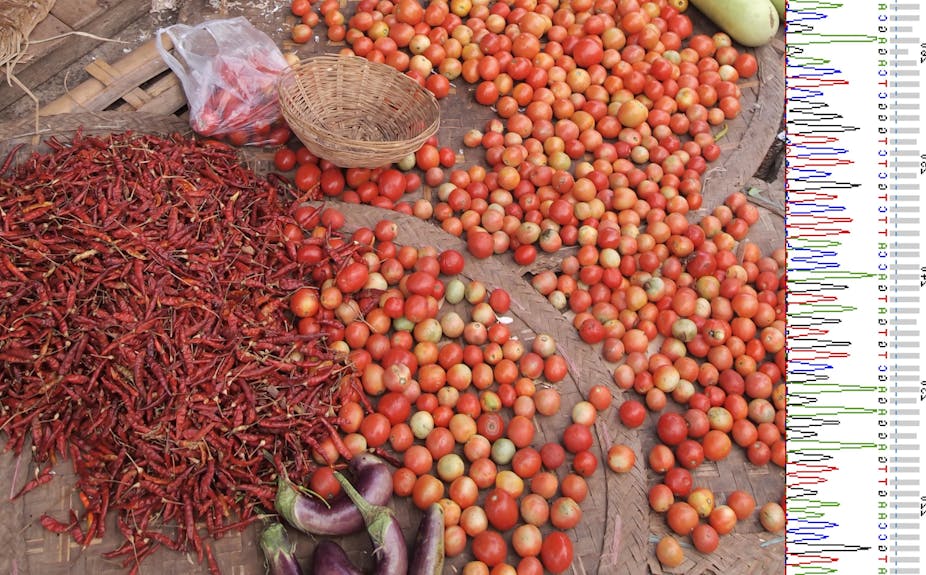A month ago, I returned to Australia from a trip to Burma. After four weeks in the country, I’d acclimatised to the culture, cuisine and people. My conditioning was so complete that on my return, I was struck by how different the anthropometric measures of the average Aussie were by comparison. People here are different to the Burmese in all kinds of measurements.
Walking around my local shopping centre, my mind fresh with visions of slight and athletically nimble Burmese, I could see how a milieu of “thrifty”, “greedy” and “drifty” genes were interacting with dietary excess and increasingly sedentary lifestyles to reshape the average Australian in a way that nature did not intend.
The reason I came to this conclusion was because my area of research is called “nutritional genetics”, part of a wider field known as “nutrigenomics”.
The definition of these two terms can vary, but a couple of good ones are that nutrigenomics considers how things in your diet influences your genome, and how this interaction modifies phenotype; that’s to say how diet alters biological systems to promote either health or disease.
Laboratory scientists working in this field would argue that it also embraces the application of advanced tools to examine functional genomics as it interacts with nutritional intake, particularly how the metabolism is controlled.
Nutrigenetics (a derivative term for nutritional genetics) is a bit different; it aims to figure out how any one of us is genetically programmed to respond in a particular way to a given dietary nutrient. A thrifty genetic trait, for instance, might make someone respond extremely rapidly (in terms of weight gain) to a diet with too much fat, increasing risk for type-2 diabetes.
This discipline deals with our underlying genetic variation, and how this co-ordinates our response to specific nutrients. While the term variation is apt, the correct phrase is “genetic polymorphism”. Many gene polymorphisms encode proteins that are used to process nutrients in different ways, such that too little or too much of a given food component can cause problems in certain individuals.
I’ve given the example of thrifty genes leading to obesity in individuals with high fat intake, but the opposite can also be true: too little of the vitamin folic acid in women with the variant 677TT MTHFR genotype, for instance, can increase risk of spina bifida.
There are many dimensions to gene-nutrient interactions, and a very important one is taking life cycle into account. Genes interact with nutrients in ways that can have different outcomes early in the life cycle compared to later. Low folate and a specific variant of the MTHFR gene can cause birth defects during embryo development as mentioned above, but also cause coronary artery disease and cancer via different downstream mechanisms in old age.
My research has considerable overlap with “epigenetics”, a field of research that examines how genetic expression of proteins is controlled. This area is particularly relevant to the dietary intake of certain nutrients that help manufacture “methyl” groups which are used to switch genes on or turn them off; such nutrients are therefore obviously required in adequate amounts. In this respect, folic acid, vitamins B2, B6 and B12 along with methionine are important. Epigenetics is considered critical for normal cell growth and division, and hence is important during embryogenesis and in the development of cancers.
One of the interesting dilemmas in nutritional sciences is that the food industry likes to produce foods that are a joy to eat. But the problem is our biology isn’t necessarily perfected to handle some of the enjoyable processed foods we are tempted with on television and in magazine ads and shop windows. Borne out of this mismatch between our modern diet and ancient genes is “evolutionary medicine”.
By understanding where such a mismatch occurs, we can address the issue and treat many of the diseases of old age that have a nutritional component. This leads to the area of “personalised medicine” in which it’s possible to provide focused preventative health care via nutritional strategies based on knowledge of key genetic variations in any given individual. If left alone, these variations could potentially promote disease.
So nutrigenomics is a bit of an umbrella term, and one that can’t be divested from other areas in which nutrition impacts human health, such as evolutionary medicine and others mentioned here. There are a great many discoveries unfolding in this area, and I suspect they will only reinforce the importance of nutrigenomics in the years to come.

